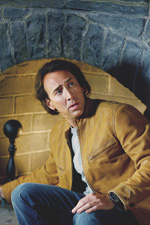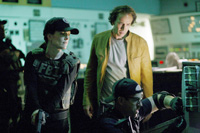You know how movies sometimes make you think certain things are happening, and then one of the characters wakes up and realizes it was all a dream? Used once or twice, this device can be pretty effective, but used too often—or too excessively, like the time the writers on Dallas decided that an entire season’s worth of episodes never took place—it can be the most groan-inducing of gimmicks.
That isn’t exactly what happens in Next, the latest film to be based on one of Philip K. Dick’s trippy, mind-bending stories (in this case, The Golden Man), but it’s pretty close. The film stars Nicolas Cage as Cris Johnson, a man who can see up to two minutes into his own future—and if he doesn’t like what he sees, then he can change his course of action and bring about a different future. But Cris does not merely see his future, as though he were observing it from a distance; he seems to actually experience his future, and it is only after he reaches a bad end that he mentally hits the “reset” button and decides to do things differently.

The result is that we in the audience experience these various alternate timelines with Cris, but whereas he knows that they lie in the future, we assume—at least the first few times—that we are experiencing the present. So when Cris hits his personal “reset” button, the rug is pulled out from under us. And throughout the earlier parts of this film, at least, it gets pulled again, and again, and again.
To be fair, the film has some fun with this conceit. When Cris wants to introduce himself to a girl—more on her in a moment—he visualizes multiple ways of walking up to her and getting her attention, most of which end in failure. We assume his first effort to meet her is the real thing, and then maybe his second effort, but by the sixth or eighth attempt or whatever, we’re in on the joke. It’s a little like watching Bill Murray’s various attempts to seduce Andie MacDowell in Groundhog Day, except we know that Cris must work more quickly, due to his two-minute time limit.

Sometimes, however, the film just lets us sit and watch Cris use those reflexes, and when it isn’t trying too hard to impress us, the results can be quite clever.
To hide the fact that he really can see the future, Cris works in Las Vegas as a stage magician named Frank Cadillac—so if anybody ever thinks his behavior is a little odd or uncanny, they’ll just chalk it up to tricks of the trade. To kill time between acts, he sometimes sits down for a card game or two at one of the other casinos—and when the security guards get suspicious, he escapes by knowing exactly where to stand, where to walk, and where to hide his face at any given moment.
Cris’s escape from the casino is smooth, calm, and basically believable. But in later scenes, his feats turn downright superhuman. Dodging a bullet seems plausible enough—if you can see a wee bit into the future and step to the side, that is—but what kind of mind could process all the information it would take to dodge an entire avalanche full of crashing logs, vehicles, and various other kinds of debris? The question is even more daunting when you consider that, in all the other timelines Cris sees during that avalanche, he probably dies or is seriously wounded.

There are moments when Cris hints at what it must be like to live with the memory of those experiences, but only moments. Most of the time he’s too busy dodging other people’s attempts to get him—and this is where some of the film’s cheesier elements come into play. The FBI, led in part by Callie Ferris (Julianne Moore), wants Cris to help them find a missing nuclear bomb before it goes off, and they are prepared to trample all over his rights in order to force him to do their bidding. Meanwhile, the bad guys—a mix of German, French, British and other Europeans—get wind of the FBI’s plan, so they try to kill Cris before the FBI can get him.
And then there is the girl. Normally, Cris can see only two minutes into the future, and normally, he can see only his own future; but for some reason he has seen a girl named Liz (Jessica Biel) sitting in a diner at a certain time of day, so he makes a point of going to that diner every day and waiting for her there. And once he meets her, romance ensues, though you have to wonder how fulfilling a relationship can be when the other person’s actions are never a surprise, or when the other person’s actions can be manipulated in some way. In fact, one of the unstated assumptions behind this movie seems to be that it is only Cris who has free will. (Or does he? Maybe seeing the future compels him to make certain choices in the present.)
At any rate, everything in the story from this point on hinges on the relationship between Cris and Liz, and while some of their initial scenes together are cute enough, some of the dialogue between them is quite laughable, and never more so than when they are supposed to be getting serious about each other.

Film buffs might appreciate some of the allusions to other, better movies. There are at least two strong Stanley Kubrick references—one of which, involving a device that props a man’s eyes open, ends on yet another ludicrous note. And when Peter Falk shows up, for no particular reason, as one of Cris’s friends, you may find yourself recalling that Falk starred in Wim Wenders’ Wings of Desire while Cage starred in its Hollywood remake, City of Angels. (And between this film and The Illusionist, it would seem that Jessica Biel has a thing for magicians.)
The screenplay—credited to Gary Goldman (Total Recall), Jonathan Hensleigh (The Punisher) and Paul Bernbaum (Hollywoodland)—has some themes in common with other recent adaptations of Philip K. Dick’s work. The early scenes bring to mind Minority Report, which also explored the idea that seeing the future could allow us to prevent it. But the later scenes—in which the fates of all the characters come together in a flurry of guns and explosions—bring to mind Paycheck, because they share with that film a certain lack of suspense. If the hero has already seen the future and taken it into account, then what difference does it make how many people chase him or how many bullets fly? We know that he’s prepared for all that.
The script has even bigger problems, though, some of which I can’t get into here for spoiler reasons. But suffice to say that there are a few major plot holes, and while some moviegoers will want to come out of the theatre talking about some of the really cool concepts the film explores—like the relationship between memory and experience and objective reality—others will come out of the theater wanting to rip the movie apart. And the film will have given them ample opportunity to do so.
Talk About It
Discussion starters- Cris says that when you see the future, you change it. Do you agree? What role do things like prophecy and free will play in this? (See 1 Samuel 23:7-13 or Jonah 3.)
- Do you believe in “destiny”? Is the future mapped out? Does God experience the future, or only see the future, or is the future a mystery to him, too? (See current debates between “open theists” and “classical theists.”)
- If you “experience” something in a movie, does it really happen? What if the movie tells you afterwards that the experience wasn’t real? If it felt “real” while you were watching the movie, does that feeling still count for something? How does your experience of these alternate futures parallel Cris’s experience? How is it different?
The Family Corner
For parents to considerNext is rated PG-13 for intense sequences of violent action (including lots of gunplay and a few very significant explosions), and some language (about half-a-dozen four-letter words). Two characters sleep together after knowing each other for only a day or so, and are shown in bed together afterwards.
Photos © Copyright Paramount
Copyright © 2007 Christianity Today. Click for reprint information.












